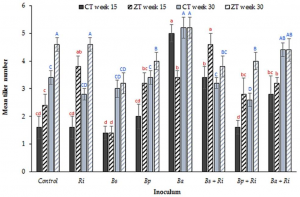A group from University of Hertfordshire, Hatfield, UK has reported that Bacillus amyloliquefaciens inoculation singularly increased winter wheat crop biomass and arbuscular mycorrhizal (AM) fungal symbiosis.
https://www.ncbi.nlm.nih.gov/pmc/articles/PMC8309287/
Microbial associations between plant and soil are highly complex and provide a myriad of interactions with a wide range of plant and soil benefits including increased soil fertility and aggregation, improved plant immunity and defence, increased plant biomass and carbon sequestration. Arbuscular mycorrhizal (AM) fungi are one of the constituent organisms within the rhizosphere of an estimated 80% of terrestrial plants forming mutualistic biotrophic symbiosis with host plants. Mycorrhizal helper bacteria (MHB) stimulate mycorrhizae formation and further enhance plant-fungi symbiosis. The role of MHB and their interaction with AM fungi is poorly understood as is the extent of the tripartite rhizobacteria-AM fungi-host plant relationship. As MHBs, three Gram-positive Bacilli species were used in addition to (Ri) AM fungus R. intraradices in this experiment: (Bs) B. subtilis, (Bp) B. pumilis, and (Ba) B. amyloliquefaciens.
Soil cultivation by conventional tillage (CT) has been shown to directly influence the abundance and diversity of the soil microbiome. The hyphal networks of AM fungi are damaged by CT resulting in decreased root cortical arbuscules. However, the impact of tillage on rhizobacteria is relatively unknown. So, a series of experiments was done under two tillage regimes, CT and zero tillage (ZT).

As a conclusion, it was found that B. amyloliquefaciens (Gram-positive Bacilli) applied singularly increased winter wheat crop biomass and AM fungal symbiosis.
